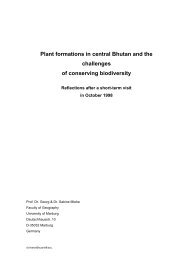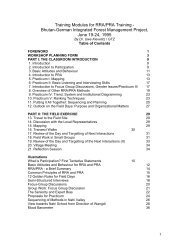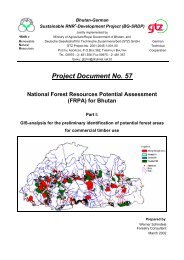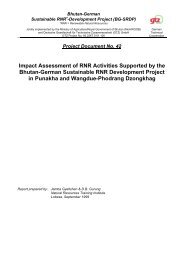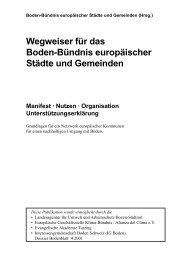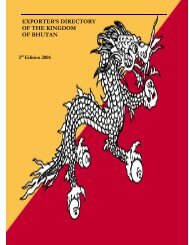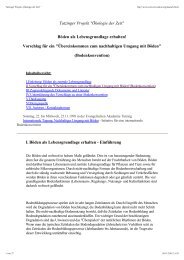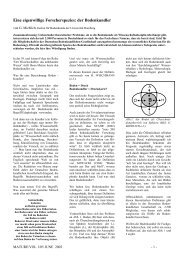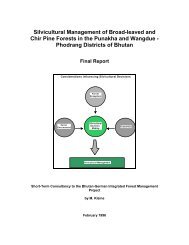GTZ Project Document No. 51 Report on Nahi Baseline Survey
GTZ Project Document No. 51 Report on Nahi Baseline Survey
GTZ Project Document No. 51 Report on Nahi Baseline Survey
You also want an ePaper? Increase the reach of your titles
YUMPU automatically turns print PDFs into web optimized ePapers that Google loves.
<strong>Nahi</strong> Approach Road of Hope RRA <strong>Survey</strong> May 2001SOME PROBLEMS AND DANGERSHow to find the poorer, and learn from and with them.Lecturing instead of listening and learning- in this problem worse with men than women, worse witholder men than younger, and worst of all with those who have retired? Who holds the stick? Who wagsthe finger? Who teaches? Who listens? Who learns?Senior people (and also younger <strong>on</strong>es) who do not want to spend time in the field let al<strong>on</strong>e camp ornight halt in a village.Rushing (rapid and wr<strong>on</strong>g again)Imposing “our” ideas, categories, values, without realising we are doing it, making it difficult to learnfrom “them” and making them appear ignorant when they are not.<str<strong>on</strong>g>No</str<strong>on</strong>g>rmal professi<strong>on</strong>al pressures, including the tyranny of (bad, not good) statisticians, the desire forformal statistical respectability, and the compulsi<strong>on</strong> to measure things rather than just compare, rank,score, identify trends…Wanting to be snug and safe in the warm womb of a preset programme and method.Finding the questi<strong>on</strong>s to ask. (We assume we know what to ask. The beginning of wisdom is to realisehow often we do not know, and to recognise that we need “their” help).Male teams and neglect of women (again and again and again)Lecturing instead of listening and learning. Yes it has to be repeated. This can be a pers<strong>on</strong>al problem,which we do not recognise in ourselves. It is best treated as a joke, and pointed out to each other whenwe err. Which we will do.Approaches and Methods“Approach” is basic. If our attitudes are wr<strong>on</strong>g, many of these methods will not work or not work aswork as well as they should. Where attitudes are right and rapport is good, we can be surprised by whatvillagers show they know, and what they can do.D<strong>on</strong>’t be put off by the length of this list. Probably no pers<strong>on</strong> in the world has used all of thesemethods. The purpose of listing them is to show that the menu is varied. There is much try out andexplore, and much to invent for yourself.Some of the approaches and methods are,Offset the anti-poverty biases of rural development tourism (spatial, project, pers<strong>on</strong>, seas<strong>on</strong>al,courtesy,)Find and review sec<strong>on</strong>dary data. They can mislead. They can also help a lot.Observe Directly (see for yourself)Do-it-yourself supervised and taught by them (levelling a field, transplanting, weeding, lopping treefodder, collecting comm<strong>on</strong> property resources, herding, fishing, cutting and carrying fodder grass,firewood, etc.)Find key informantsSemi-structured interviewing (has a mental or written checklist, but be open to new aspects and tofollowing up <strong>on</strong> the new and unexpected.Group Interviews are often powerful and efficient. (Casual/encounter/focus deliberately structured,etc.)Sequences or chains of interviewsThey do itParticipatory mapping and modelling (social, health or demographic maps, resource maps of villagelands or forests, maps of fields, etc.)Transect walks (systematically walking with key informants through an area, observing, asking,listening, discussi<strong>on</strong>, identifying different z<strong>on</strong>es, local technologies, etc.)Time line (a history of major remembered events in a village or community with approximate dates.Local histories (peoples accounts of the past, of how things close to them have changed, ecologicalhistories, histories of cropping patterns, etc.)Seas<strong>on</strong>al Diagramming (rainfall distributi<strong>on</strong>, cropping calendar, farm labour, etc.)xxvi



